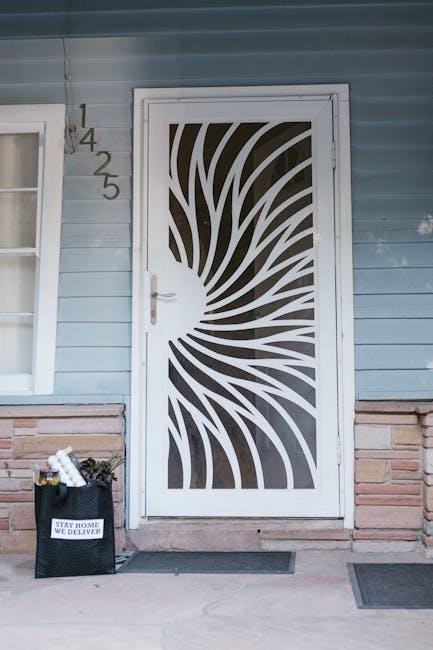Yeonmi Park’s memoir, In Order to Live, recounts her harrowing escape from North Korea at 13, detailing survival, resilience, and the quest for freedom amid unimaginable oppression.
Overview of the Book
In her memoir, In Order to Live, Yeonmi Park recounts her harrowing journey of escaping North Korea at the age of 13 alongside her mother. The book chronicles their perilous flight from oppression, detailing the immense hardships they faced, including being sold into slave marriages by Chinese brokers. Park vividly portrays their escape through China’s dangerous underworld, the daunting crossing of the Gobi Desert to Mongolia, and their eventual path to freedom in South Korea. Beyond the physical challenges, the memoir delves into Park’s internal struggle to confront her traumatic past and find true freedom. This gripping narrative highlights resilience, the quest for freedom, and the enduring strength of the human spirit, offering readers a profound understanding of life under oppressive regimes.
Importance of the Memoir
In Order to Live holds significant importance as a powerful testament to resilience and freedom. Yeonmi Park’s memoir provides an unflinching look at life in North Korea, exposing the regime’s brutality and human rights abuses. By sharing her personal struggles, Park sheds light on the broader plight of North Koreans and the challenges faced by defectors. The book not only raises awareness about the oppressive regime but also inspires readers to reflect on the value of freedom and human dignity. Its vivid storytelling and raw honesty make it a crucial read for understanding the complexities of life under dictatorship and the enduring strength of the human spirit in pursuit of liberation. This memoir is a call to action, urging global attention to the ongoing suffering in North Korea.
Yeonmi Park’s journey, as chronicled in In Order to Live, is a testament to her unyielding determination to survive and seek freedom. At just 13 years old, she fled North Korea alongside her mother, enduring immense hardships, including being sold into slave marriages by Chinese brokers. Her escape led her through China’s treacherous underworld of human traffickers and smugglers, eventually crossing the Gobi Desert to Mongolia under the guidance of the stars. From there, she reached South Korea, where she began to rebuild her life. Her story is one of courage and resilience, highlighting the dangers faced by North Korean defectors and the enduring hope for a better future. Park’s journey from oppression to freedom serves as a powerful reminder of the human spirit’s ability to overcome even the darkest challenges. Her experiences have inspired countless readers worldwide, offering a glimpse into the unseen struggles of North Korean refugees. Yeonmi Park, born in Hyesan, North Korea in 1993, is a human rights activist and author of In Order to Live, detailing her escape and resilience. Yeonmi Park was born in 1993 in Hyesan, North Korea, where she experienced a semi-privileged upbringing under the oppressive regimes of Kim Jong-Il and Kim Jong-Un. Despite her relatively better circumstances compared to many North Koreans, she witnessed widespread poverty, starvation, and political repression. Her early life was marked by the harsh realities of living in one of the world’s most repressive nations, where freedom of expression and basic human rights were severely curtailed. These experiences deeply shaped her perspective and later motivated her to seek freedom. Her story highlights the struggles faced by North Koreans in their daily lives. Yeonmi Park’s decision to escape North Korea was deeply influenced by her family’s struggles and the oppressive regime. Born into a relatively privileged family, her father’s involvement in illegal metal smuggling exposed them to risks, while her mother endured immense hardship. The death of her father from cancer and the family’s subsequent economic collapse pushed them to the brink. Faced with starvation and despair, Yeonmi and her mother made the perilous choice to flee, seeking a better life. Their journey was driven by the hope of freedom and survival, highlighting the desperation that compelled many North Koreans to escape the regime’s oppressive grip. After escaping North Korea, Yeonmi Park pursued her education in South Korea and later in the United States. She attended Dongguk University and then Columbia University, where she studied and began advocating for human rights. Her experiences shaped her into a prominent voice, raising awareness about North Korea’s oppression. She co-authored her memoir with Maryanne Vollers, detailing her journey and struggles. Through speaking engagements and advocacy, she continues to highlight the plight of North Koreans, inspiring global action and hope. Yeonmi Park’s escape from North Korea began at 13, fleeing with her mother through China’s underworld, facing human trafficking, and enduring immense hardships. Guided by the stars, they crossed the Gobi Desert to Mongolia, ultimately reaching South Korea. This perilous journey, marked by hunger, exploitation, and loss, tested her resilience and determination. Her escape highlights the desperate measures North Koreans take to seek freedom, revealing the harsh realities of life under oppression and the strength of the human spirit to survive and thrive against all odds. Her story is a testament to courage and the unyielding pursuit of freedom. Yeonmi Park’s decision to leave North Korea was driven by unbearable hunger and despair. At just 13, she witnessed her homeland’s oppressive regime, where starvation and fear dominated daily life; Her family’s struggle intensified as the economy collapsed, and they faced unimaginable hardships. The realization that survival in North Korea was precarious pushed her and her mother to flee. They sought a better life, unaware of the dangers ahead. This pivotal choice marked the beginning of a harrowing journey, fueled by the desire to escape a system that offered little hope. Her decision to leave was a desperate bid for survival and freedom, setting the stage for a perilous escape that would change her life forever. Yeonmi Park faced immense challenges during her escape from North Korea. She and her mother were sold into slave marriages by Chinese brokers, enduring exploitation and trauma. The journey across China was perilous, with constant fear of detection and deportation. Crossing the Gobi Desert to reach Mongolia was another dangerous phase, with limited resources and guidance from the stars. The physical and emotional toll of these experiences was immense, yet her determination to survive and find freedom drove her forward. These hardships highlight the resilience and courage required to overcome the oppressive systems she navigated during her escape. China played a complex role in Yeonmi Park’s escape, offering both refuge and peril. After crossing into China, Park and her mother were exploited by human traffickers who sold them into forced marriages. Despite the dangers, China served as a transitional zone for their journey, allowing them to move closer to freedom. However, the lack of legal protection and the risk of repatriation to North Korea posed constant threats; Park’s experiences highlight the precarious situation of North Korean refugees in China, where survival often depends on navigating an underworld of smugglers and brokers. China’s role underscores the challenges faced by those fleeing oppressive regimes. The final steps to freedom for Yeonmi Park were marked by both relief and new challenges. After enduring the harsh journey through China and the Gobi Desert, Park and her mother finally reached Mongolia, where they were aided by Christian missionaries who facilitated their escape to South Korea. Upon arrival, Park experienced a mix of emotions, from the joy of safety to the struggles of adapting to a vastly different culture. With the help of South Korean authorities and support systems, she began rebuilding her life, learning the language, and navigating societal norms. Her journey culminated in a new beginning, where she could finally embrace freedom and hope for the future. In Order to Live explores themes of survival, resilience, and freedom, detailing Yeonmi Park’s personal struggles and her escape from North Korea’s oppressive regime to find hope. The memoir delves into themes of survival, resilience, and freedom, highlighting Yeonmi Park’s journey from oppression to hope. It explores the human spirit’s strength amidst adversity, including starvation, exploitation, and loss. The book also examines the harsh realities of life in North Korea, shedding light on systemic oppression and human rights abuses. Park’s personal growth and transformation from a victim of circumstance to a global advocate for freedom are central to the narrative. The interplay of fear, courage, and redemption underscores her quest for identity and liberation. Ultimately, the book serves as a powerful testament to the enduring pursuit of freedom and dignity in the face of overwhelming odds; Yeonmi Park’s memoir vividly portrays her personal struggles, from enduring starvation in North Korea to facing exploitation in China. Her triumphs include escaping oppressive regimes and overcoming immense emotional trauma. The book highlights her journey from innocence to resilience, as she navigates the underworld of human trafficking and eventual freedom. Park’s story is a testament to the human spirit’s ability to endure and overcome even the most daunting challenges. Her eventual resettlement in South Korea and rise as a global advocate for human rights underscore her remarkable triumph over adversity. Through her experiences, Park inspires hope and resilience in readers worldwide. Yeonmi Park’s memoir sheds light on the dire human rights situation in North Korea, revealing a society governed by fear, starvation, and oppressive control. The book highlights the regime’s brutality, where citizens are denied basic freedoms and subjected to relentless surveillance. Park’s experiences illustrate the widespread suffering, including food scarcity, forced labor, and the regime’s suppression of dissent. Her story exposes the systemic human rights abuses, such as the imprisonment of political dissidents and the exploitation of vulnerable populations. Through her journey, Park brings attention to the plight of North Koreans, emphasizing the need for global awareness and action to address these injustices. In Order to Live has profoundly impacted readers worldwide, offering a raw and personal perspective on North Korea’s human rights crisis. The memoir’s vivid narrative has raised global awareness about the regime’s oppression, inspiring empathy and outrage. Many readers have reported feeling deeply moved by Park’s resilience and courage, prompting reflections on freedom and human dignity. The book has also sparked discussions on the need for international intervention and support for North Korean defectors. By sharing her story, Yeonmi Park has not only educated readers but also empowered them to advocate for change, making her memoir a powerful tool for human rights advocacy and education. In Order to Live received widespread acclaim for its raw honesty and emotional depth, with critics praising Park’s courage and the book’s vivid portrayal of survival and hope. In Order to Live has garnered widespread critical acclaim for its unflinching portrayal of survival and resilience. Reviewers praise Yeonmi Park’s raw honesty and emotional depth, calling it a powerful memoir that sheds light on North Korea’s harsh realities. The book has been described as a vivid and haunting account of one young woman’s journey to freedom. Many have highlighted its ability to humanize the struggles of North Korean defectors, making it a must-read for understanding the region’s complexities. Readers worldwide have found the memoir inspiring, commending Park’s courage in sharing her story and its impact on raising awareness about human rights issues. Despite its acclaim, In Order to Live has faced controversy, with some questioning the accuracy of certain details. Critics argue that elements of Yeonmi Park’s story were altered for narrative impact, sparking debates about memoir authenticity. Additionally, the book’s portrayal of North Korea has been criticized by regime sympathizers, who claim it exaggerates oppression. Others have accused Park of being a puppet for anti-North Korean propaganda. These controversies, however, have not diminished the book’s impact, as many still view it as a vital perspective on life under authoritarian rule. The debates highlight the challenges of recounting traumatic experiences and the political sensitivities surrounding North Korea. Readers of In Order to Live have been deeply moved by Yeonmi Park’s courage and resilience. Many describe the book as a heart-wrenching yet inspiring account of survival, praising its raw honesty and emotional depth. Some readers have expressed gratitude for the insight into North Korea’s hidden struggles, while others highlight the book’s ability to humanize a often-misunderstood population. The memoir has sparked widespread empathy and admiration for Park’s journey, with many calling it a must-read for understanding the human cost of oppression. Critics and readers alike commend Park’s storytelling, noting its power to raise awareness about human rights issues. The book has left a lasting impact, inspiring reflection on freedom and resilience. In Order to Live sets Yeonmi Park’s story against North Korea’s oppressive regime, China’s role in human trafficking, and the challenges faced by refugees in South Korea. Yeonmi Park’s memoir, In Order to Live, vividly portrays the oppressive political climate of North Korea, where the regime’s totalitarian control suffocates individual freedom. The government’s strict censorship, constant surveillance, and brutal suppression of dissent create an atmosphere of fear and repression. Parks narrative highlights the regime’s propaganda machine, which glorifies the Kim dynasty while concealing the nation’s economic devastation and human rights abuses. The political climate is marked by a rigid class system, where loyalty to the regime determines access to resources and opportunities. This oppressive environment drove Park and her family to seek survival outside the regime’s grasp, illustrating the desperation born of such political tyranny. Yeonmi Park’s memoir, In Order to Live, sheds light on the harrowing reality of human trafficking in China, a lucrative trade that preys on North Korean defectors. Many, like Park and her mother, are sold into forced marriages or exploited for labor by Chinese brokers; The lack of legal protections and the clandestine nature of these networks leave victims vulnerable. Park’s experience reveals the intersection of poverty, desperation, and systemic corruption, where women are treated as commodities. Her story underscores the broader issue of human trafficking in China, a crisis exacerbated by the influx of North Korean refugees seeking escape from their oppressive homeland, only to find new perils across the border. Upon reaching South Korea, Yeonmi Park faced a new set of challenges as a refugee, including cultural adaptation and societal expectations. Despite the initial shock of transitioning to a capitalist society, she embraced the opportunity to rebuild her life. Park pursued education, eventually enrolling in college, and became a vocal advocate for North Korean human rights. Her journey in South Korea symbolizes resilience and the pursuit of freedom, highlighting the complexities refugees face in integrating into a new society while healing from past traumas. Her story illuminates the transformative power of hope and determination in overcoming adversity. Yeonmi Park’s personal growth is marked by her education at Columbia University and her tireless advocacy for North Korean human rights, inspiring global change through her voice. Yeonmi Park has become a prominent advocate for human rights, particularly for North Korean defectors. After resettling in South Korea and later moving to the United States, Park dedicated her life to raising awareness about the atrocities faced by North Koreans. She has spoken at numerous global events, sharing her personal story to highlight the oppression and human rights violations in North Korea. Park’s advocacy extends to supporting other defectors, helping them adapt to new lives in free societies. Her memoir, In Order to Live, has further amplified her voice, inspiring international efforts to address the plight of North Koreans and promote freedom. Yeonmi Park’s journey from North Korea to freedom taught her invaluable lessons about resilience, courage, and the true meaning of freedom. She learned that survival often requires difficult choices and adaptability, especially when faced with extreme adversity. Park also realized the importance of confronting the past to achieve true liberation, both physically and emotionally. Her experiences highlighted the strength of the human spirit and the universal desire for dignity and freedom. These lessons have shaped her advocacy work, inspiring others to stand against oppression and fight for human rights. Her story serves as a testament to the power of perseverance and hope. Yeonmi Park’s memoir delivers a powerful message of hope and freedom, transcending her personal story to inspire global audiences. Through her journey, she illustrates that freedom is not just physical liberation but also mental and emotional. Park’s experiences show that even in the darkest circumstances, hope can sustain the human spirit. Her transformation from a North Korean refugee to a global advocate underscores the importance of resilience and the pursuit of truth. By sharing her story, Park aims to inspire others to fight for their rights and dignity, proving that freedom is a universal aspiration. Her message resonates deeply, encouraging readers to embrace hope and strive for a better future.Yeonmi Park’s Journey

Background of the Author
Early Life in North Korea
Family and Motivations for Escape
Education and Career After Escape
The Escape Journey

Decision to Leave North Korea
Challenges Faced During the Escape

Role of China in the Escape
Final Steps to Freedom in South Korea


The Book’s Content
Key Themes in “In Order to Live”
Personal Struggles and Triumphs
Human Rights Issues in North Korea
Impact of the Book on Readers

Reception and Reviews
Critical Acclaim and Praise
Controversies Surrounding the Book
Reader Responses and Feedback
Historical Context
North Korea’s Political Climate
Human Trafficking in China
Refugee Experience in South Korea

Personal Growth and Advocacy
Yeonmi Park’s Advocacy Work
Lessons Learned from the Journey
Message of Hope and Freedom
